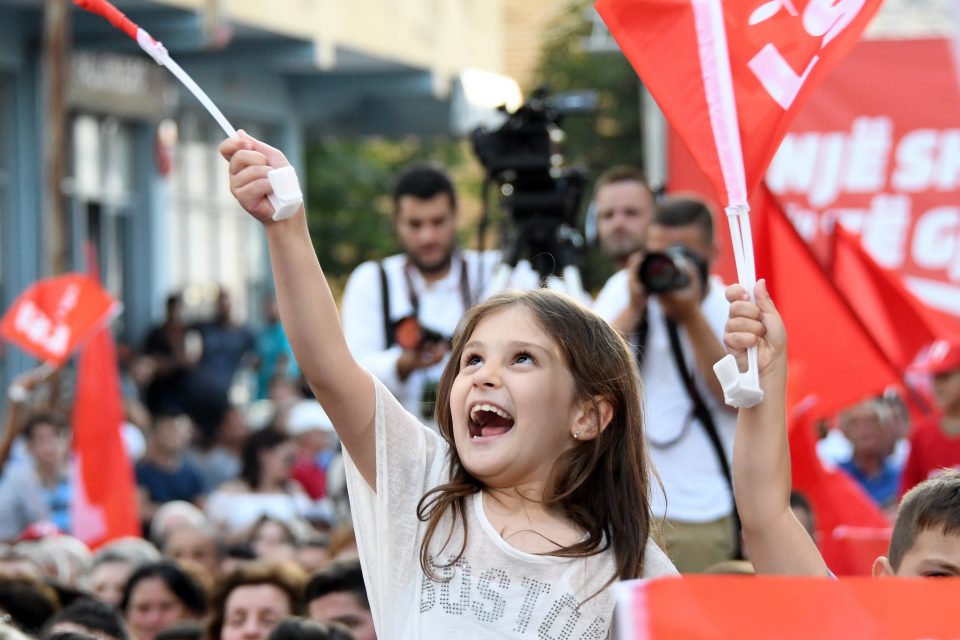
by Briseida Mema and Rusmir Smajilhodzic
Agence France-Presse
TIRANA, Albania (AFP) – Albania votes in parliamentary elections on Sunday with hopes that a long tradition of polling fraud, violence and disputed results will come to an end and propel the country toward European Union membership.
The Socialist Party of Prime Minister Edi Rama, 52, appears to have just a slight advantage over the center-right Democratic Party of Lulzim Basha, 43, according to opinion polls.
After a 2009 election, the Rama-led Socialist opposition cried fraud and urged supporters onto the streets for months of protests. Three were shot dead in 2011.
When power changed hands in 2013, the right accepted defeat but engaged in a strategy of obstruction and boycotting the work of the 140-seat parliament, where insults have been exchanged since.
Although Basha, an admirer of United States President Donald Trump, has officially led the Democrats for four years, his predecessor Sali Berisha, a former Albanian president and premier, remains a powerful and unifying figure on the right.
His party had threatened to boycott the election until a month ago, raising concerns about the vote being unfree and unfair.
Although the two sides struck a deal, with the Democrats given key ministerial posts in the run-up to the vote, the rhetoric remains lively.
Trading slurs
“Edi Rama has supported a handful of people who… got their hands on the economy, and a handful of criminals who seized power and made Albania a drugstore,” Basha told AFP, referring to Albania’s illicit but lucrative cannabis trade.
Rama retorted to AFP that Basha “is an opposition leader who is not ready for the challenge of governing the country.”
On the campaign trail he lampooned his rival for lacking experience, calling him “a watermelon that one must open to see if it is ripe or not.”
“Everyone is good for something, but Luli (Basha’s nickname) is only good for putting people to sleep,” the premier joked.
But beyond these skirmishes, this campaign was “the first where the two largest parties have practically laid down their arms,” according to political scientist Skender Minxhozi.
In the streets there are “no big banners, no posters, no flags,” he said.
Another analyst, Ardian Civici, even bet on a “grand coalition” between the Socialists and Democrats.
This would allow them to oust the Socialist Movement for Integration, the party of President-elect Ilir Meta, a 48-year-old who for 10 years has played kingmaker in Albanian politics, switching his support between sides.
Beyond personal animosities, the two main sides also agree on one overriding aim, said Civici: the opening of EU accession negotiations.
Inefficient justice
The challenges for the next government promise to be huge.
While Rama has set a post-election target of “above five percent” growth, Albania remains one of the poorest countries in Europe, with an average monthly salary of 340 euros.
The country is being emptied of its youth, who are unable to find jobs at home. While 2.9 million Albanians live in the country, 1.2 million live abroad — a world-record ratio.
Albania has been a candidate for EU accession since 2014, but membership remains a far-off goal.
In its last report on the country, the EU notably criticized the “slow and inefficient” judicial system in which “corruption remained prevalent,” with a low number of convictions for organized crime.
Rama says ongoing judicial reform will lead to “good results,” although it will take “a decade or so” to have a judicial system that meets European standards.
“Even France has not succeeded in ending corruption,” he said, but the current reform is going to “bring it down to an acceptable level” in Albania.
It will also be necessary to convince foreigners of the authorities’ determination to end the scourge of cannabis.
Polls will be open from 0500 GMT until 1700 GMT under the eye of 3,000 election observers, including 300 foreigners.
© Agence France-Presse








